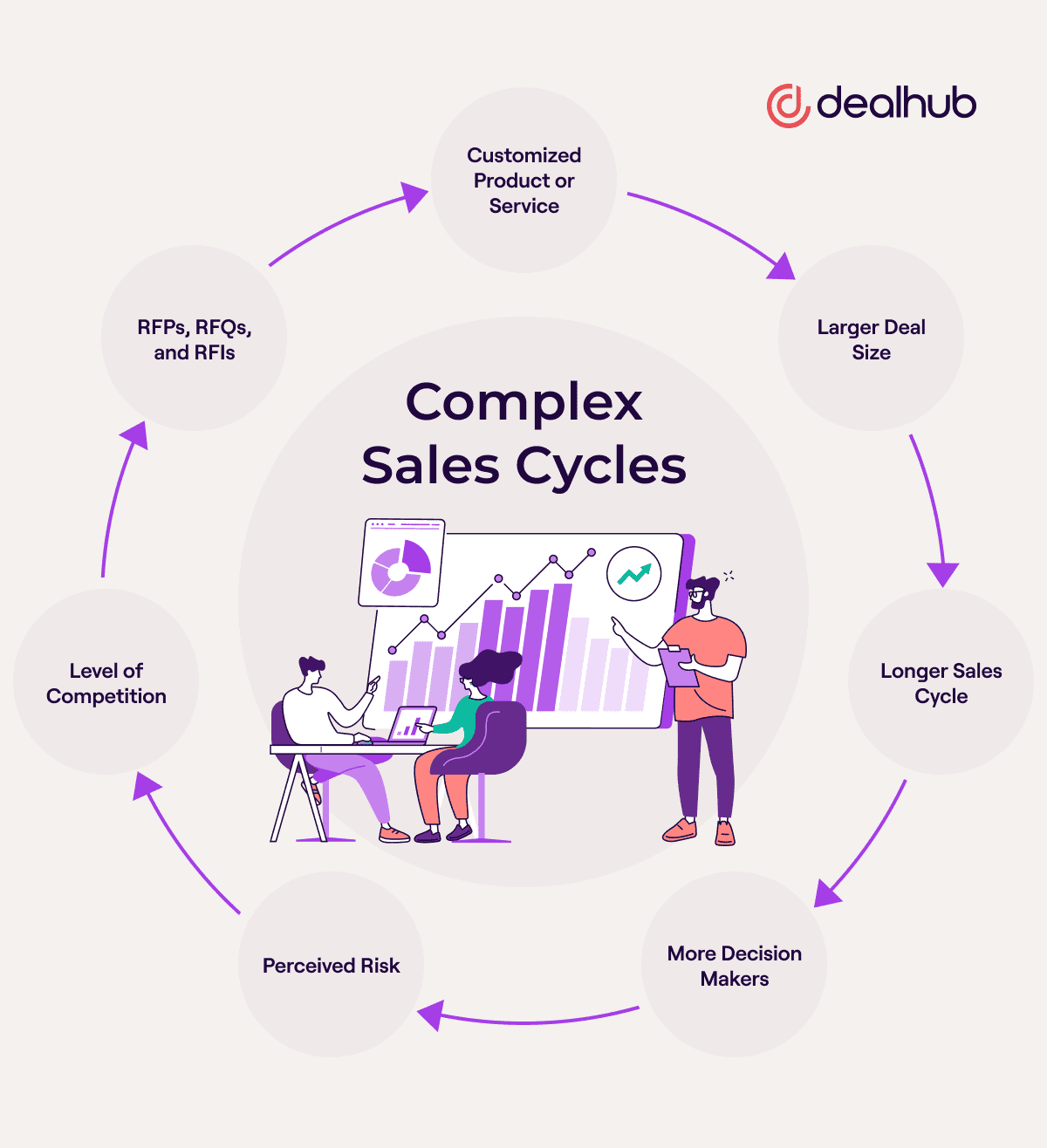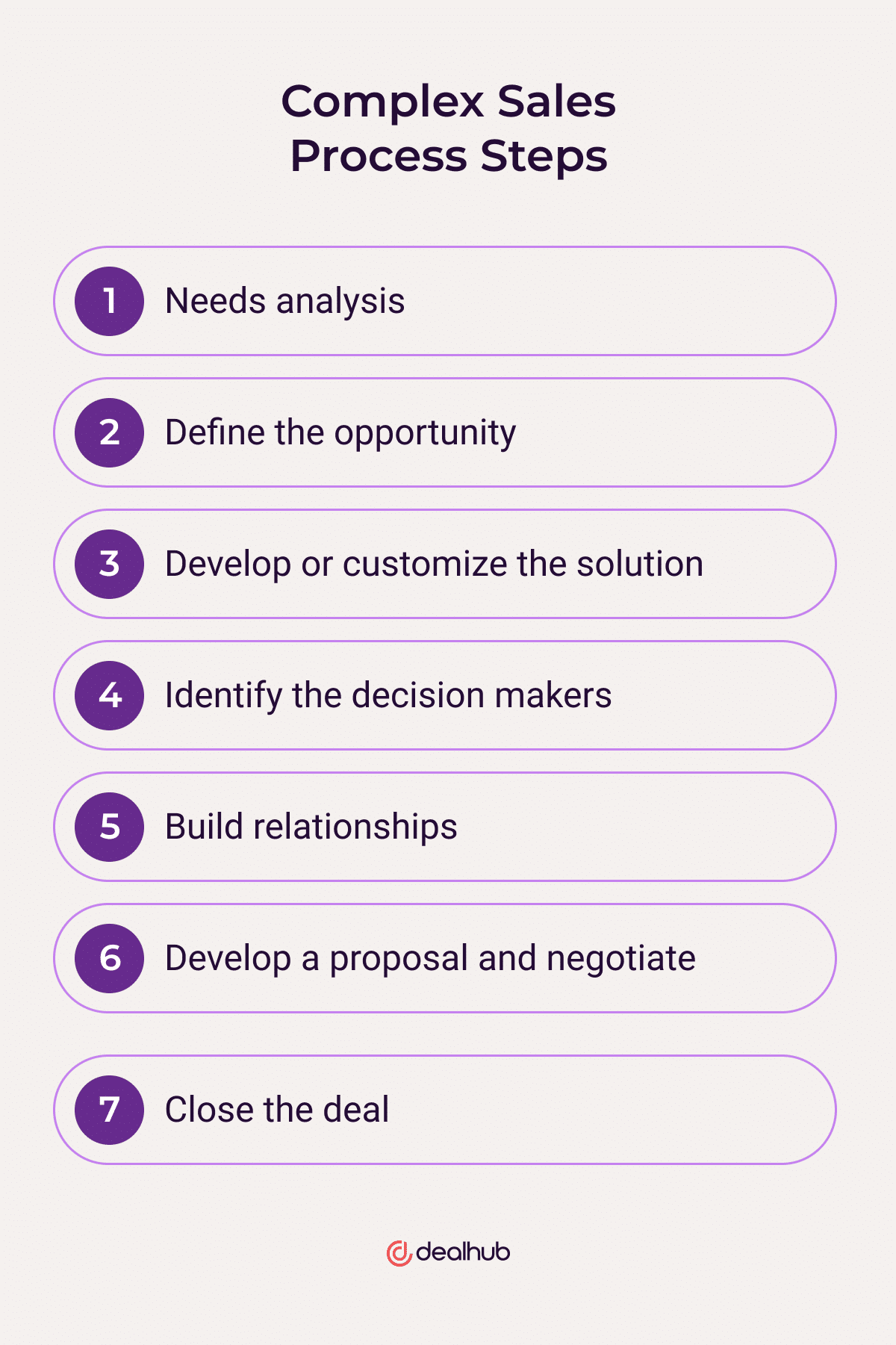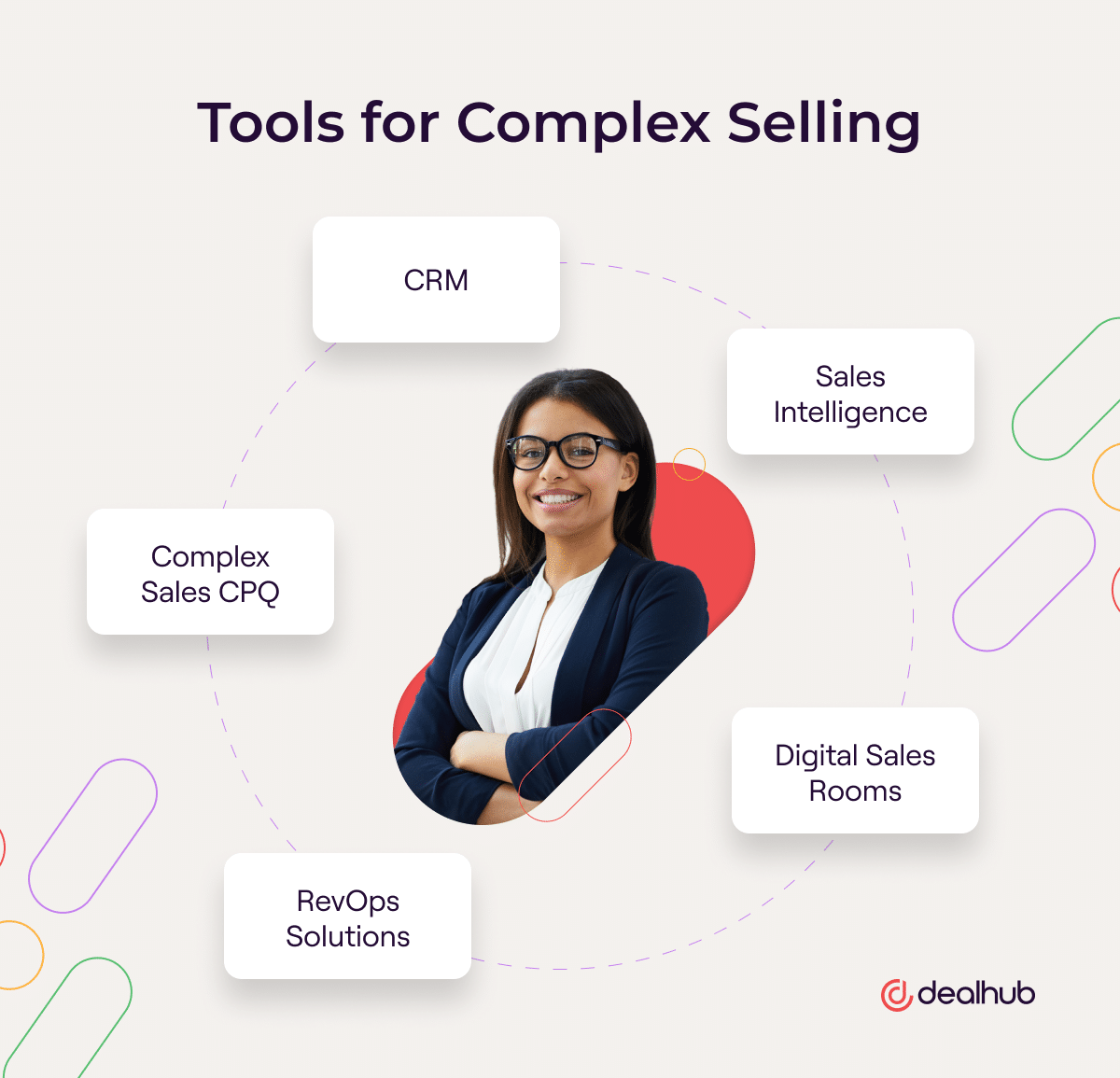Complex Sales
Table of Contents
What is Complex Sales?
Complex sales (also known as enterprise sales) usually involve products or services that are high-value and/or customizable, and require a longer sales cycle. The complex sales process often involves multiple decision-makers within an organization, each with their own objectives and concerns. Because of the complexity, these deals can be very challenging and require a different strategy than simple, transactional sales.
Some common examples of complex sales include:
- Selling software or other technology products
- Selling to large organizations
- Selling customized products or services
- Selling consultative services
The key to successful complex sales is understanding the customer’s needs and aligning the vendor’s solution with the customer’s objectives. It’s also important to have a deep knowledge of the product or service and effectively communicate the value proposition. Building strong relationships with customers is also critical, as is being able to navigate the internal politics of large organizations.
Synonyms
- complex sales cycle
- complex sales process
- complex selling
- enterprise sales
Understanding Complex Sales Cycles
Many factors can impact the length and complexity of a sales cycle. Some factors include the product or service sold, the deal size, the number of decision-makers involved, and the level of competition.

Complicated or Customized Product or Service
Certain products or services can be more complex to sell than others. For example, selling a new software program to a company will likely involve a longer and more complex sales cycle than selling an established product to an individual consumer.
Larger Deal Size
The deal’s value can also impact the complexity of the sales cycle. Larger deals will generally take longer to close and involve more decision-makers and stakeholders.
Longer Sales Cycle
Enterprise sales typically takes longer than sales of simpler products or services. This is because buyers of complex products or services need to understand all the features and benefits of what they’re considering purchasing, and they often need approval from multiple decision-makers within their organization. Generally speaking, the more expensive and impactful a product or service is, the longer it will take to sell it.
More Decision Makers
The more decision-makers involved in the purchasing process, the longer and more complex the sales cycle because each decision-maker must be convinced of the product’s or service’s value before agreeing to purchase it.
Perceived Risk
Potential buyers may hesitate to commit to a purchase if they perceive the project as risky. This can be due to various factors, including the complexity of the project or uncertainty about its success.
Level of Competition
If many companies are selling similar products or services, it can lengthen the sales cycle as businesses compare options and look for the best deal.
RFPs, RFQs, and RFIs
RFPs, RFQs, and RFIs are commonly used by buyers when purchasing complex products or services. These tools are used to:
- gather information from several potential suppliers in a structured and efficient way
- ensure that all potential suppliers are given an equal opportunity to compete for the business
- help identify the supplier who can best meet the buyer’s needs
RFQs and RFPs can also be used to help negotiate the final price of a product or service. Buyers can often secure better terms by inviting multiple suppliers to submit bids.
Since buyers often use RFPs, RFQs, and RFIs when buying complex products or services, they contribute to the complexity of the selling process and the length of the sales cycle.
The challenges of complex sales cycles require a different approach than simpler transactions. Salespeople need to be highly knowledgeable about their product or service and must be able to communicate its value to potential customers effectively. They also need to be skilled in building relationships and navigating through the various stages of the sale.
While complex sales can be challenging, they can also be very rewarding. Successfully closing a complex sale can lead to significant revenue and a long-term relationship with a valued customer.
Complex Sales Process Steps
How do you manage a complex sale? Here’s an overview of the steps in a complex sales process:
- Needs analysis: vendors must understand the customer’s problem or need that the product or service will address. It involves engaging in product discovery, asking questions, listening to the customer, and doing research.
- Define the opportunity: what are you selling, and who are the buyers?
- Develop or customize the solution: Once the need has been identified, the next step is to develop a solution that meets it. This may involve developing new products or services, or tailoring existing ones.
- Identify the decision makers: who will make the final decision on whether to buy?
- Build relationships: get to know the decision-makers and their needs.
- Develop a proposal and negotiate: The solution is then presented to the customer in a sales proposal. This stage also involves negotiating terms and conditions, price, and other contract details.
- Close the deal: at the closed-won stage, sales reps get sign-off from the decision-makers, finalize the sale, and deliver the product.
Sales of complex products and services can be a challenge for even the most experienced salespeople. Understanding how complex sales work is essential for success in this arena.

Complex Sales Examples
Some industries have complex sales cycles that can be difficult to manage. There are often many variables at play, and the sales process can be lengthy and convoluted.
Below are examples of industries where complex sales are the norm.
- Pharmaceuticals: The sale of pharmaceutical products is often subject to strict regulation and can involve lengthy negotiations between buyers and sellers.
- Engineering: Engineering products can be highly complex, and the sales process often involves detailed discussions about specifications and technical requirements.
- Construction: Construction and real estate development are also examples of industries where complex sales are commonplace. Projects can be large and expensive, and the sales process often involves great coordination between several parties.
- Enterprise software: Enterprise software is often very expensive, making it difficult to sell. Additionally, enterprise software is usually feature-rich and complex, making it challenging to demo and explain to potential customers. Finally, the enterprise software market is often highly competitive, making it difficult to stand out from the crowd.
Tools for Complex Selling
Sales software is designed to help salespeople close more deals and manage their sales pipeline more effectively. In complex selling environments, such as B2B sales, sales software can be a critical tool for success.

There are a number of features that make complex selling software different from other types of software. Firstly, it needs to be able to track and manage multiple stakeholders. This could include keeping track of who has been contacted, what their role is in the decision-making process, and what stage they are at in the buying journey.
Secondly, software used to automate complex sales processes needs to be able to handle a high volume of data. This might include financial information, product specifications, or customer data. The software needs to be able to store this data securely and make it accessible to the sales team when required.
Thirdly, complex selling software needs robust reporting capabilities so businesses can track progress against their sales targets and identify areas where improvements need to be made.
Many software applications can be used in complex selling environments, each with advantages and features. The most popular options include CRM, sales intelligence, CPQ, digital sales rooms, and revenue operations platforms.
CRM
CRM software helps sales teams manage customer relationships and track customer data. Sales can be a complex process involving many different stages and touchpoints. A good CRM system can help to manage this complexity by providing a central repository for sales information and tracking progress through the various deal stages.
This can help sales teams improve efficiency and close more deals. In addition, a good CRM system can provide valuable insights into customer behavior, helping to drive future sales strategies.
Sales Intelligence
Sales intelligence software enables salespeople to access real-time data on potential customers and helps them decide where to focus their efforts. In addition, sales intelligence software provides valuable insights to help sales teams close more complex deals.
The software gives sales teams access to data on trends and patterns to help them understand customer needs and develop successful strategies. Sales intelligence software also provides tools for tracking progress and measuring success, which is essential for complex sales cycles. By using sales intelligence software, sales teams can optimize their performance and increase their chances of success.
Complex Sales CPQ
Sales complexity is one of the main challenges businesses face when trying to close a deal. Configurable products and pricing can make it difficult to determine the final cost of a sale, which can often lead to lost opportunities or deals falling through.
CPQ software helps businesses overcome this challenge by providing a tool that can quickly configure products and prices according to each customer’s specific needs. When using CPQ, sales reps can be sure they are always configuring products correctly and offering the best possible price. This level of accuracy helps sales reps close deals more quickly and efficiently.
In addition, CPQ software can help businesses streamline their sales process by automating many tasks typically associated with complex sales. This includes quote and proposal generation, as well as order management and fulfillment. By using CPQ software, businesses can reduce the time and resources they need to invest in each sale, leading to significant cost savings over time.
Digital Sales Rooms
Sales teams face many challenges when working on complex sales, from coordinating multiple team members to managing large amounts of data. Digital sales room software can help overcome these challenges by providing a central platform for collaboration and information management.
Digital sales room software helps teams coordinate by giving all members a clear overview of the sales process and progress. This can be especially helpful when working on long-term or multi-stage sales, as it ensures everyone is on the same page and no details are forgotten. In addition, digital sales rooms often include features such as task lists and calendars to further help with coordination.
Digital sales room software also makes it easy to manage large amounts of data related to complex sales. Information can be organized into folders and files, and team members can be given different access levels depending on their needs. This ensures that everyone has the information they need without being overwhelmed by data that is not relevant to them.
Overall, digital sales rooms can be valuable for teams working on complex sales. It helps with coordination and information management, two of the biggest challenges in complex sales. As such, it can help make complex sales simpler and more efficient.
RevOps Solutions
A RevOps platform is a software application that helps organizations manage and optimize revenue operations. The platform enables businesses to automate and streamline key RevOps processes, including customer acquisition, customer success, sales, billing and invoicing, and finance and accounting.
The RevOps platform provides a single source of truth for all RevOps data, which makes it easier for organizations to track progress and performance against key RevOps KPIs. The platform also includes tools for analyzing RevOps data and identifying areas of improvement.
In complex sales environments, RevOps solutions can help streamline the quote-to-cash process, improving visibility into the sales pipeline and helping to ensure a smooth close. By automating key tasks and workflows, RevOps solutions can free up time for sales teams to focus on selling, not paperwork.
In addition, by providing real-time insights into sales performance, RevOps solutions can help businesses identify potential problems quickly and take corrective action before they impact the bottom line.
People Also Ask
What is a complex sales process?
A complex sales process is a type of sales process that involves multiple steps and may take longer to complete than a simpler sale. Typically, complex sales involve more parties, negotiation, and documentation. They may also be higher-value transactions.
Complex sales processes can be found in various industries but are especially common in B2B settings. Businesses often need to make decisions as a team, and there may be a lot of back-and-forth negotiation and stakeholder buy-in required before an agreement is reached.
How are complex sales different from traditional sales?
The complex sales process is significantly different from the traditional sales process. In a traditional sales process, there is usually only one decision-maker involved. However, in a complex sale, there are often multiple decision-makers. This can make the sales process much more challenging.
Another key difference is the length of the sales cycle. A traditional sale might have a cycle of just a few weeks or months. However, a complex sale can often take years to complete. This is because there are usually many more steps involved, and each step can take a significant amount of time.
Finally, the price of a complex sale is often much higher than a traditional sale since the product or service is usually more expensive and complicated to configure.
What are the four stages of a complex sale?
The four stages of a complex sale are:
1. Prospecting: This is the stage where the marketing or sales team identifies potential customers and builds relationships with them.
2. Qualifying: In this stage, the sales development team determines whether or not a prospect is a good fit for the product or service.
3. Needs Analysis: During this stage, sales reps learn about the prospect’s needs and how the company’s product or service can meet those needs.
4. Closing: The final stage of a complex sale is when the sales reps close the deal and make the sale.

